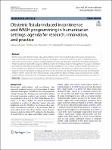Search
Author
- Cooper, Davina (2)
- Eidenmüller, Horst (2)
- Emad, Gholam Reza (2)
- Fiorato, Sidia (2)
- next >
Subject
- Vulnerability (3)
- CJEU (2)
- COVID-19 pandemic (2)
- Criminal Law (2)
- next >
Date issued
Has File(s)
Search Results
This article probes the usefulness of the notion of basic level categorisation for legal theory. Basic level categorisation is the central part of the vertical dimension of Eleanor Rosch’s prototype theory. It addresses the question about the various levels of abstraction at which humans can categorise the world. Extensive anthropological, psychological and linguistic research has proven that there is a preferable level of abstraction, namely the basic level, at which primary categorical cuts of the perceived world are made. Three areas of legal theory are identified when applying these findings. The first is the area of visualisation of legal rules. The notion of basic level categories addresses some of the known problems of discrepancies between the visualisation of a rule and its... |
The proposal for the Artificial Intelligence Act is the first comprehensive attempt to legally regulate AI. Not merely because of this pioneering role, the draft has been the subject of controversial debates about whether it uses the right regulatory technique, regarding its scope of application and whether it has sufficient protective effect. Moreover, systematic questions arise as to how the regulation of constantly evolving, dynamic technologies can succeed using the means of the law. The choice of the designation as Artificial Intelligence Act leads to legal-theoretical questions of concept formation as a legal method and legislative technique. This article examines the difficulties of regulating the concept of AI using the scope of the Artificial Intelligence Act as an example.... |
Women living with obstetric fistula-induced incontinence (OFII) have heightened need for water, sanitation and hygiene (WASH) services because they experience involuntary leaking of urine, feces, or both. In humanitarian settings where access to WASH services is notably limited, research and innovation relating to OFII and WASH programming has not been granted the requisite attention, relative to menstrual hygiene management. The paper is intended to bring to the attention of humanitarian researchers and practitioners the research needs of women living with OFII. Three thematic areas that have the propensity to arouse interest in this neglected topical issue and help to set the stage for research and actions are discussed. These are the prevalence of OFII, prevention of OFII, and WA... |



